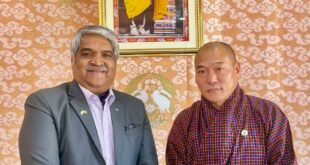The Department of Public Information of the United Nations and its partners from civil society organizations organized a special briefing event entitled “Happiness and Gender Equality in the Sustainable Development Goals” on 17 March 2016 at the United Nations in New York in observance of the 60th Session of the Commission of the Status of Women and the International Day of Happiness.
The briefing examined the implementation of the United Nations Sustainable Development Goals (SDGs), specifically Goal 3 and 5 and discussed different perspectives about the role of each goal in government, civil society, the private sector and in everyday individual practice in the context of promoting gender equality.
H.E. Mrs. Kunzang C. Namgyel, Permanent Representative of the Kingdom of Bhutan to the United Nations was invited to address the participants of the event on the progress made since the establishment of the International Day of Happiness, an initiative of Bhutan.
In her address Kutshab said that the idea of “happiness” as a universal goal had struck a global chord and brought about a profound shift in attitudes and approaches to development all over the world. She said that the adoption of the 2030 Agenda with its focus on people, planet and peace was a strong testimony to that.
Kutshab however underscored that urgent action was needed to fulfill the pledge made under the Beijing Declaration and Platform for Action in order to make real progress for a happier world. She highlighted that with women and girls constituting almost half of the world’s population, progress in the pursuit of happiness would remain elusive without the elimination of all forms of violence against women and girls and without gender equality and the empowerment of women. She said that the adoption of the 2030 Agenda presented a unique opportunity to ensure a happier world. In this context, she underscored that SDG 5, with its explicit call for gender equality and empowerment of all women and girls, provides a strong framework to meet the unfulfilled pledge made in Beijing 20 years ago.
Statement by H.E. Ambassador Kunzang C. Namgyel at the special event to mark the 60th Session of the Commission of the Status of Women and the International Day of Happiness, 17 March 2016, United Nations, New York
At the outset, I would like to thank the Department of Public Information and its partners for organizing this important event as part of the 60th session of the Commission on the Status of Women and the International Day of Happiness, which will be celebrated on 20 March.
On 19 July 2011, the UN General Assembly adopted resolution 65/309 entitled “Happiness: towards a holistic approach to development. It recognized happiness as a “fundamental human goal” and called for a holistic approach to economic growth that promotes the happiness and well being of all peoples. On 28 June 2012 the UN General Assembly adopted resolution 66/281 establishing 20th March as the International Day of Happiness.
Since then, the issue of “happiness” in the global development agenda has certainly struck a global chord as evident from the many celebrations by people from all walks of life around the world to recognize the International Day of Happiness since 2013.
More importantly, beyond the celebrations of the day, there has been a renaissance of the idea that “Happiness is the meaning and purpose of life, the whole aim and end of human existence” as Aristotle so eloquently put it about 2500 years ago.
Today, it is increasingly evident that there is a profound shift in our attitudes and in our approach to development all over the world. A growing number of countries, leaders, public and civil society organizations, academia and most importantly ordinary citizens are starting to question the way we measure progress and are recognizing that happiness is fundamental to human existence.
Most recently, the adoption of the 2030 Agenda with its focus on people, planet and peace is a strong testimony to such a shift in attitudes. It reaffirms that a common thread holding humanity together is our universal quest for a more holistic approach to economic growth that promotes the happiness and well being of all peoples.
In the case of my country Bhutan, the noble goal of Gross National Happiness (GNH) will continue to guide Bhutan’s path to sustainable development and achieving the SDGs. For us, in the words of His Majesty the King, and I quote:
“GNH is the bridge between the fundamental values of Kindness, Equality and Humanity and the necessary pursuit of economic growth. GNH acts as our National Conscience guiding us towards making wise decisions for a better future. It ensures that no matter what our nation may seek to achieve, the human dimension, the individual’s place in the nation, is never forgotten. It is a constant reminder that we must strive for a caring leadership so that as the world and country changes, as our nation’s goals change, our foremost priority will always remain the happiness and wellbeing of our people – including the generations to come after us.”
As we celebrate the advancements made on the establishment of the International Day of Happiness, I would like to reflect on and underscore an area that needs urgent attention if we are to indeed make real progress for a happier world.
Twenty years ago, in the Beijing Declaration and Platform for Action, we made a solemn pledge to ensure equal rights and opportunities for women and girls so that they can live their lives free from want, fear and violence. Few of us, if any, would disagree with the fact that we are far from meeting that pledge. Even as we speak, the burden of political and economic crisis, poverty and wars globally are born by women, girls and children. There is still much to be done, globally and in my own country, to achieve the vision of the Beijing Platform of Action.
Today, at 3.6 billion, women and girls constitute almost half of the world’s population. Progress in our pursuit of happiness will therefore remain elusive if we do not eliminate all forms of violence against women and girls and fail to ensure gender equality and the empowerment of women.
With the adoption of the 2030 Agenda, we are presented with a unique opportunity to ensure a happier world. SDG 5, with its explicit call for gender equality and empowerment of all women and girls, provides a strong framework to meet that unfulfilled pledge made in Beijing 20 years ago. Achieving the transformative agenda of the SDGs will no doubt be challenging. It will require action beyond governments and institutions. It will require all of us, as individual citizens of this world, to be agents of the change that we wish to see in this world.
In this context, and in conclusion, allow me to share a remark by His Majesty the King during his delivery of the Madhavrao Scindia Memorial Lecture entitled ‘Changing World and Timeless Values’ in 2009. And I quote:
“This is a world that is shared – not between governments and nations but among us, the people. It may sound idealistic – but this is a natural and practical way of approaching things that seem intractable and inflexible – no matter how big the problem. The image of a shared planet must always be present in our minds – and especially in the minds of those who are in positions of leadership… There is only one starting point to resolve any problem – big or small – that is one’s self. Each one of us must embark upon our personal journey towards the timeless goal of living a good life – being a good human being – even as we tackle the world’s largest problems.”
End of quote
I could not agree more with His Majesty. For the last time I read the Charter of the UN it said “We the Peoples of the United Nations”.
 Ministry of Foreign Affairs and External Trade RGOB
Ministry of Foreign Affairs and External Trade RGOB


